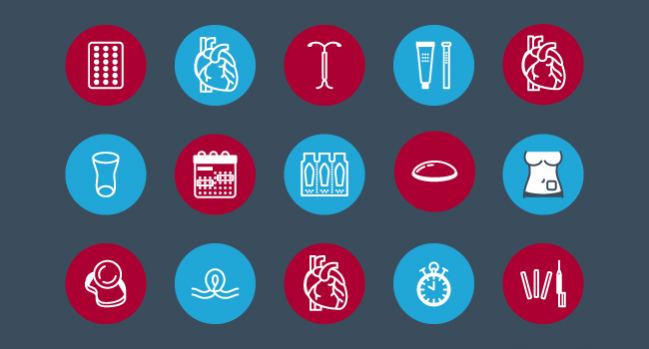As CDC Moves to Update Contraception Guidance, Cardiologists Should Take Note
There’s a knowledge gap among clinicians and patients about which methods are safe to use for women with CVD.

The US Centers for Disease Control and Prevention (CDC) is seeking public input on an update to their contraception guidelines, and, as one cardiologist told TCTMD, physicians should pay special attention to hormone-based birth control given its potential interaction with cardiovascular health.
The issue is ever more pressing as CV risk factors have become more prevalent in younger adults. While women of childbearing age likely make up a minority of most cardiology practices, experts say the onus remains on cardiologists to be aware of the risks associated with oral contraceptives and to make sure their patients are informed.
The current CDC guidelines provide advice on who can take these medications safely and who can’t, based on factors such as age, weight, family history, and various cardiovascular conditions.
Chrisandra Shufelt, MD (Cedars-Sinai Medical Center, Los Angeles, CA), however, says cardiologists today may be unaware of some of the relevant contraindications or concerns, and emphasized that some important groups aren’t getting the attention they deserve.
“Cardiologists need to know about the US Medical Eligibility Criteria for Contraceptive Use, because this guide outlines medical recommendations for specific contraceptive methods in women with certain medical conditions,” Shufelt said in an email to TCTMD. “Specifically, there are many CVD conditions listed, such as hypertension and hyperlipidemia. Still, since 2016, there have been CVD-specific conditions that should be added to this list that are more common in women, such as Takotsubo, POTS [postural orthostatic tachycardia syndrome], and microvascular disease.”
With new generations of contraceptive pills emerging, the CDC’s guidance should address the different formulations of synthetic progestins and estrogens for women with CVD, she said.
Combined hormonal oral contraceptives are generally considered a safe and effective method of preventing pregnancy. Still, hypertension should be monitored, as birth control pills alter blood pressure. Factors such as diabetes, high cholesterol, a body mass index greater than 30 kg/m2, and physical inactivity can increase the risk of clotting in a woman on birth control pills. More-pressing indications such as family history of premature CVD, prior venous thrombosis, and smoking increase that risk further.
An article published earlier this year in the Journal of the American College of Cardiology provides up-to-date details on contraception and reproductive planning in at-risk women with known CVD.
Knowns and Unknowns
“Birth control is great. It’s a great medication. We don't want to not take it because you learned that this complication might happen. But you definitely want to know what . . . the risks are, and whether you have a higher risk than other people and should be concerned,” stressed Mary Cushman, MD (University of Vermont Medical Center, Burlington), a vascular hematologist who says she sees many referral cases of women who develop venous thrombosis while on the pill.
“One of the common threads I hear from patients after the fact is that they didn’t know about it,” said Cushman. “They didn’t know how to recognize it, and they didn’t know if it happened to them. Trying to get it in front of the right audience is the challenge, . . . so women can get educated.”
Shufelt noted that while the risk of blood clots is widely known, other indications are more obscure. Back in 2009, she and colleague C. Noel Bairey Merz, MD (Cedars-Sinai Medical Center), wrote a review paper devoted to hormone contraceptive use and CVD. They describe, for instance, data showing that oral contraceptives can prolong QT interval, potentially interacting with other drugs to cause arrhythmias, and that genetic mutations such as Factor V Leiden may elevate the risk of clotting. More recently, as reported by TCTMD, one study showed progestin-based oral contraceptives triple CV events in women with congenital long QT.
Kathryn J. Lindley, MD (Washington University Medical Center, St. Louis, MO), agreed that there are many unknowns.
“There is a large knowledge gap among both cardiologists and patients about which contraceptive methods are safe for patients with cardiovascular disease,” she said. “There is oftentimes a failure to recognize that the long-acting, reversible methods”—eg, intrauterine devices or male condoms—“are safe for essentially all women no matter what their cardiovascular condition is and often when physicians are unsure whether a method is safe, they just recommend against it, and the result is that women end up using barrier methods alone, which are very ineffective methods.”
Although existing research suggests there are myriad risk factors worth considering, birth control pills can be taken by most women and, for some with CVD wishing to avoid pregnancy, a necessity. There has been a push in the past decade to make oral contraceptives available over-the-counter, with the support of organizations such as the American Academy of Family Physicians, as a way to address access and cost barriers.
However, in Shufelt’s opinion, obtaining birth control pills without the proper risk evaluation and informed consent could be too bold a move.
“There’s too many factors involved when you make a decision to put a woman on birth control, in my book, to make them over-the-counter,” she said. “Yet we need to balance that with unwanted pregnancies and what the complications are with pregnancy. So there’s a very fine balance here.”
One of the CDC’s objectives in reviewing their contraception guidance, a process typically done every 5 years, is to help mitigate these lapses in knowledge and communication among researchers, physicians, and the general population. They aim to “provide evidence-based recommendations to assist healthcare providers when counseling patients on contraceptive choice and use.”
The agency will be collecting public comments online through October 18, 2021.
In 2021, Alexandra Dangas did a 2-month internship in the digital and editorial departments at TCTMD.
Read Full BioSources
US Centers for Disease Control and Prevention. Updating CDC's contraception guidance documents: U.S. medical eligibility criteria for contraceptive use and U.S. selected practice recommendations for contraceptive use. Published on: August 19, 2021. Accessed on: September 2, 2021.



Comments